
Vietnam's foreign policy at threshold of a new historical starting point
Latest
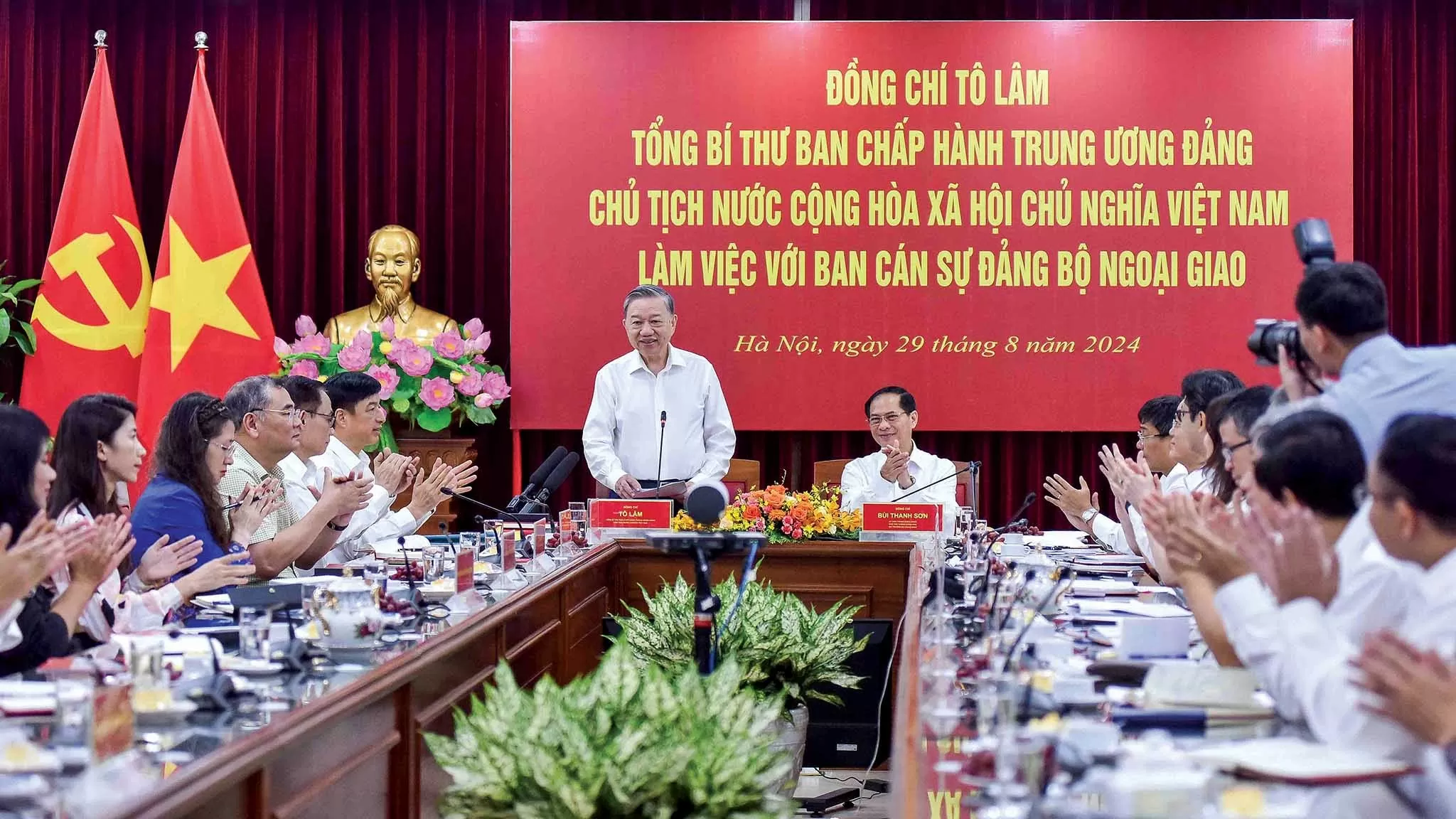 |
| General Secretary and President To Lam works with the Party Committee of the Ministry of Foreign Affairs on implementing the foreign policy of the 13th National Party Congress and developing the diplomatic sector, August 29, 2024. (Photo: Nguyen Hong) |
In 2024, the world continues to undergo profound transformations, with new and complex developments affecting every aspect of social life. It is also a pivotal year for the nation as it enters the final stage to successfully implement the goals set forth by the 13th Party National Congress Resolution. In this context, external affairs have been carried out comprehensively and effectively, with vibrant activities yielding many positive results.
Despite external challenges, Vietnam has consistently stood out as a "bright spot" of peace, stability, and development in the region. The "significant and historically meaningful" achievements in external affairs since the beginning of the tenure, as recognized by key national leaders, have been sustained and further promoted, contributing to the nation's overall progress.
Successfully Implementing the 13th Party Congress’s Foreign Policy
External relations activities, particularly high-level diplomacy, have been actively carried out, enhancing the country’s international standing. Guided by the foreign policy set forth by the 13th National Party Congress and under the close leadership and direction of the Party Central Committee, the Politburo, the Secretariat, and key Party and State leaders, Vietnam's external activities in 2024 have been methodically and comprehensively implemented with many partners and at key multilateral forums and mechanisms.
Vietnamese leaders engaged in a total of 60 diplomatic activities, including 21 visits to other countries and participation in major multilateral conferences, as well as hosting 25 delegations of foreign leaders visiting Vietnam. These visits and external relations activities have achieved strategically significant and long-term outcomes, particularly in elevating and upgrading relations with key partners, while deepening and enhancing the effectiveness of these relationships.
Vietnam's diplomatic landscape has been reinforced and broadened, providing a solid foundation for safeguarding and building the nation. Up to date, Vietnam has established diplomatic relations with 194 countries, elevated its ties to Comprehensive Strategic Partnerships with Australia, France, and Malaysia, upgraded relations to Strategic Partnerships with Brazil, and established Comprehensive Partnerships with Mongolia and the UAE. This achievement brings the total number of partnerships under structured frameworks to 32 and over 170 cooperation agreements signed across various fields. The progress not only reflects the dynamism and proactiveness of Vietnam's external policy and diplomacy but also underscores the recognition and value other countries place on Vietnam's geopolitical significance and their desire to deepen relations with Vietnam.
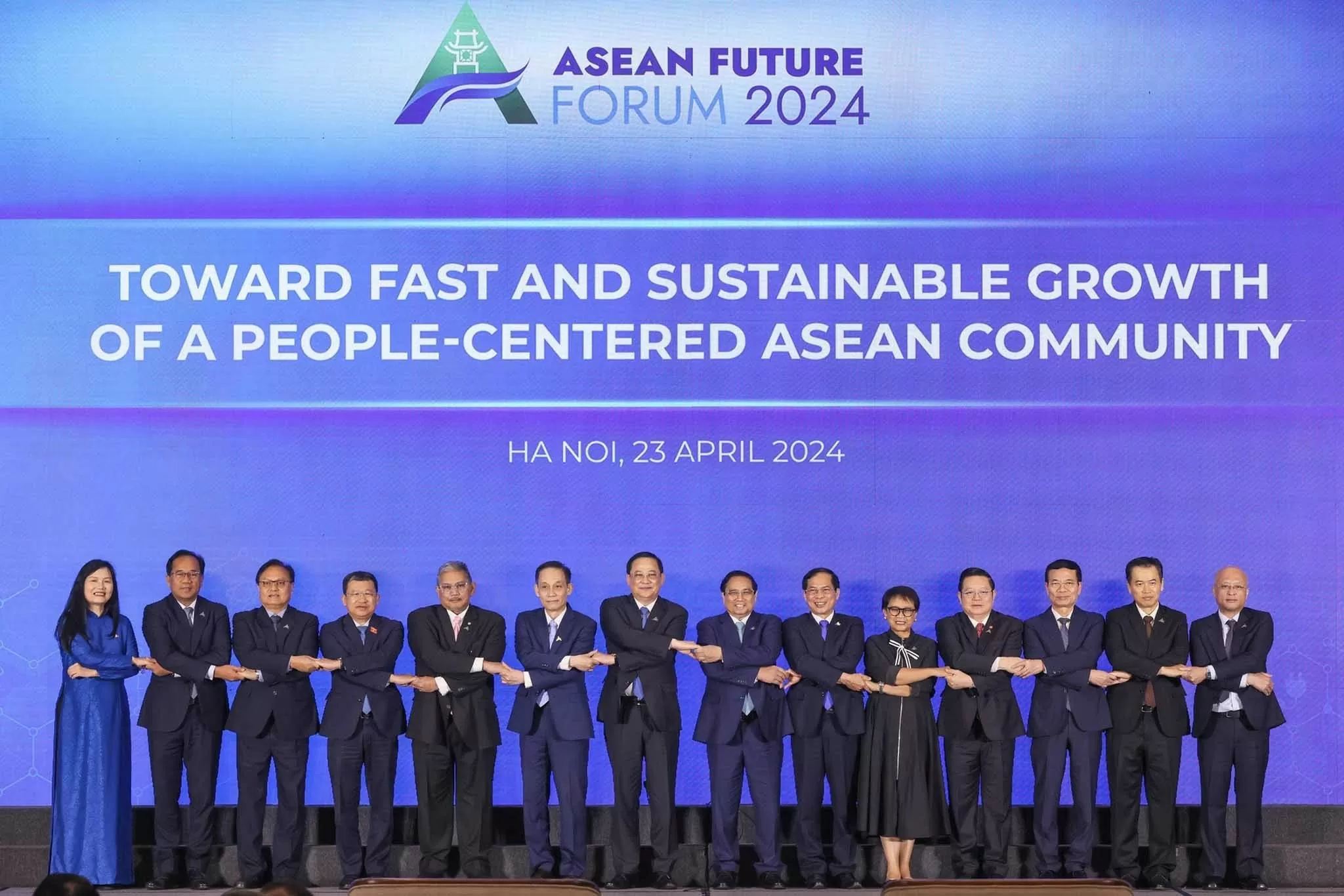 |
| Prime Minister Pham Minh Chinh and Lao Prime Minister Sonexay Siphandone along with heads of ASEAN delegations attend the ASEAN Future Forum in Hanoi on April 23, 2024. (Photo: Tuan Anh) |
On the multilateral front, Vietnam continues to affirm its capability, role, and responsibility in addressing international issues. At major international forums such as ASEAN, the United Nations (UN), the Mekong Subregion, APEC, G20, BRICS, AIPA, the Non-Aligned Movement, and the Francophonie, Vietnam has actively and effectively demonstrated its proactive role. Notably, for the first time, Vietnam successfully organized the ASEAN Future Forum, establishing a platform for dialogue to promote Vietnam’s role in shaping ASEAN’s future beyond 2025, with a vision extending to 2045.
The recent adoption of the UN Convention on Cybercrime by the United Nations General Assembly, along with the selection of Vietnam as the venue for the Convention’s signing ceremony, marks a significant milestone in Vietnam’s international legal integration and multilateral diplomacy. It reaffirms Vietnam’s position as an active, reliable, and responsible partner in the international community.
At organizations where Vietnam holds key roles, such as the United Nations Human Rights Council and six of UNESCO’s seven major governing mechanisms, Vietnam has demonstrated its capacity for meaningful contributions, introducing numerous initiatives that have garnered broad support. Additionally, Vietnam's responsible engagement in addressing global challenges—such as combating climate change, maintaining peace, and ensuring cybersecurity—has been increasingly recognized and appreciated by the international community.
To contribute to National Defense from Afar, ensuring peace before threats arise, Vietnam’s foreign affairs have effectively coordinated with other forces to fulfill the "essential and regular" mission of firmly safeguarding the nation’s independence, sovereignty, and territorial integrity while ensuring the highest national and ethnic interests. Amid significant global fluctuations, Vietnam has wisely managed its partnerships, ensuring peaceful, stable, and cooperative land borders. Progress has been made in negotiations with other nations, including advancing the development of an effective and substantive Code of Conduct in the East Sea (COC) in alignment with international law, particularly the 1982 United Nations Convention on the Law of the Sea (UNCLOS).
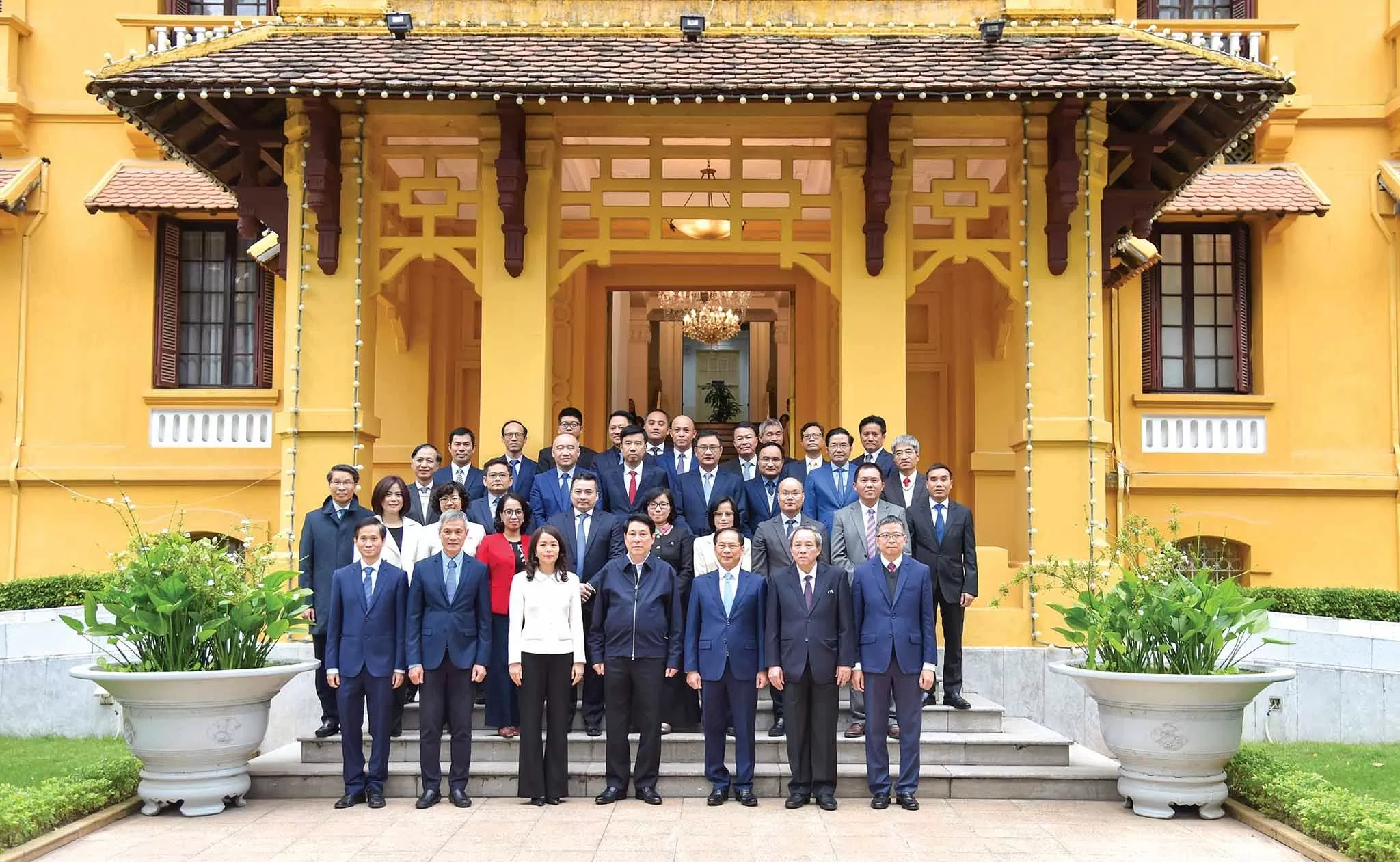 |
| President Luong Cuong visits the Ministry of Foreign Affairs on December 12, 2024. (Photo: Tuan Anh) |
At the same time, Vietnam has upheld its policy of resolving outstanding issues through peaceful means based on international law. Diplomatic agencies have provided strategic advice to the Politburo, Secretariat, and Government, enabling effective responses to the complex dynamics of the international situation.
Positioning diplomacy as a central pillar in the new era, economic diplomacy has played a pivotal role in driving breakthrough growth. Traditional growth drivers, including trade, investment, tourism, and labour, have been revitalized, deepened, and made more efficient, especially with major markets and key traditional investment partners in Northeast Asia and the Americas. Additionally, diplomatic efforts have opened new pathways into emerging markets in the Middle East and Africa, creating opportunities for economic advancement.
With a new approach, we have effectively leveraged 17 FTAs with over 60 partners, removed market barriers, and thereby contributed to the recovery of exports. This is expected to bring trade turnover to a record high of nearly USD 800 billion. We have also capitalized on the wave of investment shifts, maintaining Vietnam as one of the world's leading FDI recipients, while effectively utilizing the benefits of international commitments and agreements. Furthermore, we have promoted the ratification of the EU-Vietnam Investment Protection Agreement (EVIPA) by EU member states and sought new markets, such as Halal products for export.
At the same time, economic diplomacy has fostered new driving forces, especially in technology diplomacy, innovation, and semiconductor cooperation with key partners and major corporations. This has facilitated connections and engagement with partners in digital transformation, green transition, semiconductors, and artificial intelligence.
Attracting high-quality investment in new technology fields, particularly from leading global technology corporations, is of great significance. It contributes to the development of the semiconductor industry, the establishment of innovation centers for AI, chip design, and high-tech human resource training. This seizes the opportunities of the Fourth Industrial Revolution to create breakthroughs and achieve the nation's development goals for 2030 and 2045.
Alongside these achievements, the country's position and strength have been elevated through the synergistic effectiveness of external information efforts, cultural diplomacy, overseas Vietnamese affairs, and citizen protection. Diplomacy has successfully lobbied for UNESCO to recognize six additional titles/heritages, raising the total to 71, creating new resources for sustainable economic, cultural, and social development at the local level.
Efforts related to overseas Vietnamese have effectively implemented the Party and State's policies to care for nearly six million compatriots abroad, mobilizing resources for development with thousands of investment projects and tens of billions of USD in remittances. Citizen protection activities have actively ensured the security, safety, and legitimate rights and interests of Vietnamese citizens and businesses, especially in conflict zones, areas affected by natural disasters, and unstable regions, including evacuating thousands of citizens back to Vietnam. External information and communication work has vigorously promoted the image of Vietnam, its people, culture, and achievements in the renewal process to the global community.
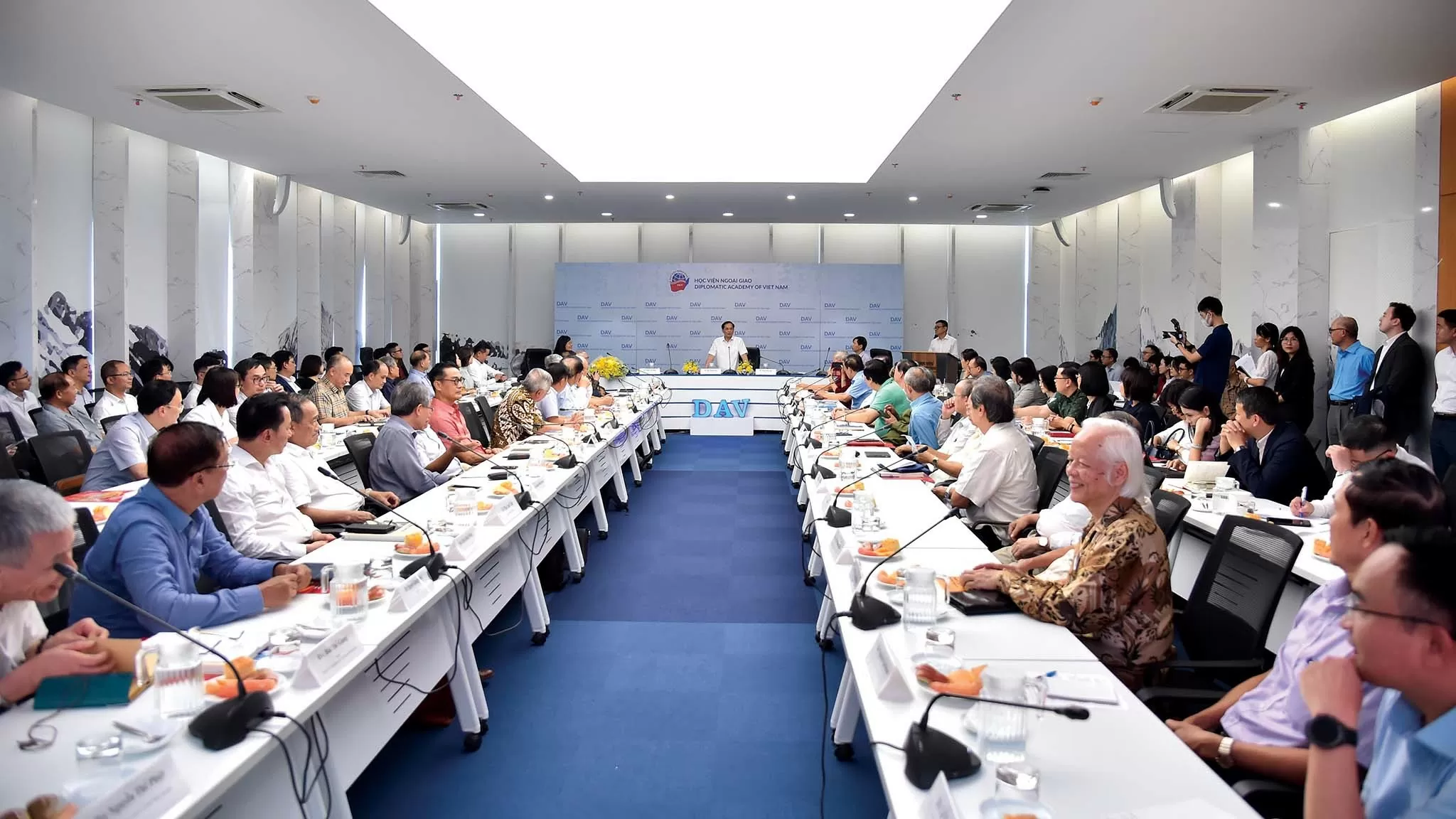 |
| Deputy Prime Minister and Minister of Foreign Affairs Bui Thanh Son speaks at the Conference “Summary of 40 years of Vietnamese Diplomacy in the Renewal period”, August 28, 2024. (Photo: Tuan Anh) |
The building of a comprehensive, modern, and professional diplomacy has been decisively implemented, especially in restructuring and organizing foreign affairs agencies in line with Resolution 18 of the 12th Party Congress. These efforts are accompanied by strengthening and rectifying the Party’s foundations in ideology, politics, ethics, and lifestyle. Methods and working styles are continuously innovated to become more professional, effective, and modern, meeting the demands of the new situation.
The significant and meaningful achievements in 2024 are closely linked to the thorough leadership and timely, sound decisions of the Party Central Committee, the Politburo, and the Secretariat. These successes are also the culmination of the concerted efforts and unity of various sectors, levels, and the entire political system, including the positive contributions of foreign affairs personnel.
Laying the Foundation for a New Era
The year 2025 holds profound significance for our nation. It marks the 80th anniversary of the founding of the country, the 50th anniversary of national reunification, and the decisive final year for achieving the objectives set by the 13th National Party Congress. Moreover, it serves as a pivotal moment for the nation to embark on a new era of development. Vietnam stands at a historic juncture, presenting new missions for its external relations and diplomacy.
During a meeting with the Party Committee of the Ministry of Foreign Affairs last August, General Secretary To Lam emphasized that in the coming period, external relations and diplomacy must “proactively and promptly identify opportunities and challenges, enhance the positive contributions of diplomacy in realizing the strategic goals of the Party's 100-year vision and the 100th anniversary of the nation’s founding.” He further called for efforts to “elevate and expand Vietnam’s contributions to the global revolutionary cause, as well as to peace, cooperation, development, and progress for humanity.” Additionally, he urged for the “broad dissemination of Vietnam’s unique model: an independent, sovereign nation characterized by peace, cooperation, friendship, development, prosperity, and happiness.”
Therefore, the overarching mission of external relations and diplomacy in 2025, as well as for the new era, is to continue maintaining the goals, principles, methods, and diplomatic approaches that have been affirmed throughout the 80 years of Vietnam’s diplomatic journey.
At the same time, in light of the profound changes of the era, it is required that Vietnamese external relations and diplomacy undergo fundamental reforms to meet the demands of this new phase.
At first, it is essential to reinforce the “important and permanent” role of foreign affairs work, foster favorable diplomatic conditions for the nation, and build strong relationship frameworks amid profound global transformations.
In today’s interconnected world, the stability and development of nations are inseparable from the regional and international environment. Since the start of the current tenure, foreign affairs have expanded, with enhanced and elevated frameworks established with various countries. This demands a new approach to fostering sustainable relationships based on greater political trust, deeper cooperation, and shared interests. At the same time, foreign relations, together with national defense and security, must work to protect the country early and proactively, maintain a peaceful and stable environment, and focus on national development.
Secondly, foreign relations play a role in creating momentum and opening new opportunities for the nation, combining internal strengths with external forces. Internal strength is fundamental and long-lasting, while external forces are crucial and transformative. These external forces include resources related to trade, investment, emerging development trends, economic linkages, a multipolar and multi-center world order based on international law, and the power of the scientific and technological revolution, as well as the knowledge economy.
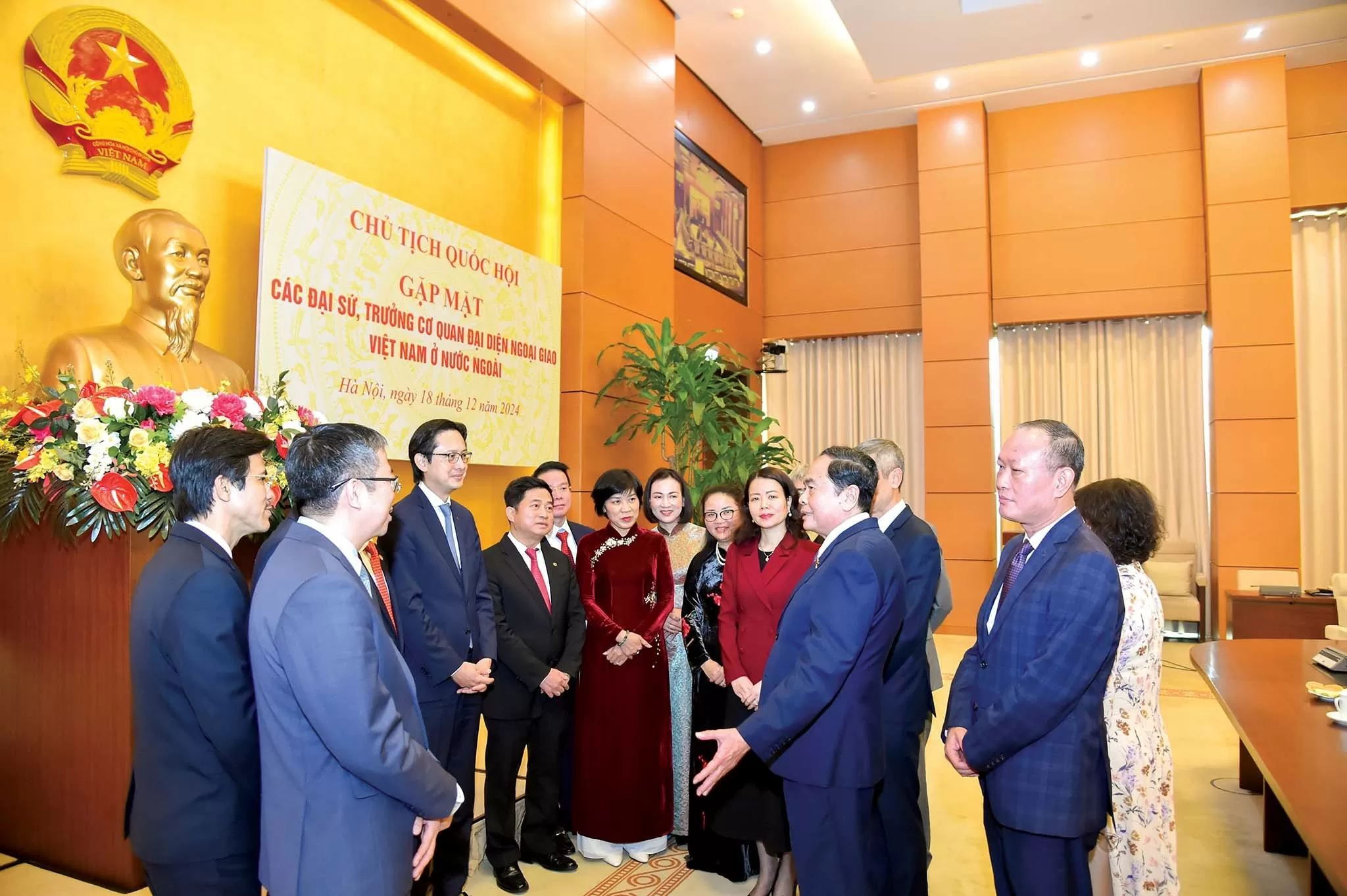 |
| National Assembly Chairman Tran Thanh Man met with Ambassadors and Heads of Vietnamese diplomatic missions abroad before taking up his duties on December 18, 2024. (Photo: Tuan Anh) |
"Drawing lessons from the experiences of advancing nations, such as the 'Asian Tigers' during their periods of rapid growth, foreign relations must focus on positioning the country optimally within key global development trends. This requires navigating and forging connections with leading partners in breakthrough and strategic fields, including artificial intelligence, semiconductors, and other cutting-edge industries."
Third, the new approach to foreign relations shifts from reception to contribution, from learning to leading, from deep integration to full integration, from a following nation to a rising nation, ready to take on new responsibilities.
The new strength and position of the country have transformed, allowing Vietnam to engage more deeply and responsibly while also being expected to contribute more to addressing global challenges. Vietnam will actively participate in building and protecting a fair and equitable international order based on international law, enhancing its contributions to global issues. Vietnam will not only participate in shaping and building multilateral institutions but also play a central, leading role in strategic issues and mechanisms that align with the nation's interests.
Fourth, it is essential to enhance the "soft power" of the nation in line with the historical and cultural significance, as well as the political and economic stature of the country. Vietnam's "soft power" lies in its rich, distinct culture, the significant and historic achievements of its renewal process, its peaceful foreign policy, and its ability to address international issues harmoniously, with reason and compassion, while respecting international law. It also includes the global support and goodwill of the people of the world.
In this new phase of development, the nation's soft power will not only serve the goal of economic and social development but, more importantly, will work towards connecting Vietnam with the world. This will increase the nation's stature and influence in global politics, the global economy, and the advancement of humanity's civilization.
Fifth, to successfully accomplish this mission, one of the key factors is to build a comprehensive, modern, and professional foreign relations and diplomacy framework for Vietnam. In terms of organizational structure, it is essential to streamline and strengthen the foreign affairs agencies, ensuring they operate effectively and efficiently while maintaining a clean and strong Party.
Regarding personnel work, following the principle that “cadres are the foundation of all work,” foreign relations and diplomacy personnel in the new era must not only possess expertise, competence, and political acumen but also be willing to think boldly, take action, innovate, and become increasingly professional in their methods, approaches, and work styles.
A new Spring has arrived with many hopeful aspirations for the country. Under the wise leadership of the Party and based on the achievements attained in 2024, Vietnam's diplomacy will continue to contribute effectively to implementing the foreign policy outlined by the 13th National Party Congress, helping to usher the country into a new era.









